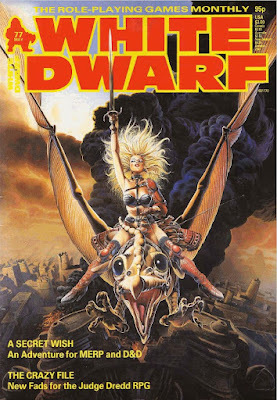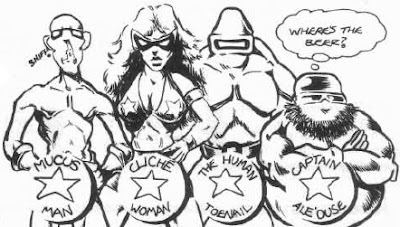White Dwarf: Issue #77
 Issue #77 of White Dwarf (May 1986) features an immediately recognizable cover illustration by Chris Achilleos. The image is probably best-known for its appearance on the September 1981 issue of Heavy Metal, though it has appeared in many other places over the years. I've noted before that, compared to Dragon, WD more regularly used re-purposed artwork for its cover illustrations, though I've never come to a satisfactory conclusion as to why this was the case. My best guess is that it was a matter of simple economics, reprinted art being perhaps cheaper than commissioning original art, but I honestly don' know if that's the case. In any event, this particular cover induces a bit of cognitive dissonance in me, since I so strongly associate it with Heavy Metal, not White Dwarf.
Issue #77 of White Dwarf (May 1986) features an immediately recognizable cover illustration by Chris Achilleos. The image is probably best-known for its appearance on the September 1981 issue of Heavy Metal, though it has appeared in many other places over the years. I've noted before that, compared to Dragon, WD more regularly used re-purposed artwork for its cover illustrations, though I've never come to a satisfactory conclusion as to why this was the case. My best guess is that it was a matter of simple economics, reprinted art being perhaps cheaper than commissioning original art, but I honestly don' know if that's the case. In any event, this particular cover induces a bit of cognitive dissonance in me, since I so strongly associate it with Heavy Metal, not White Dwarf.
Issue #77 is also the last issue under the editorship of Ian Marsh. Marsh only took over in issue #74, so his departure so soon after his installation comes as a bit of a shock. In his final editorial, Marsh states that "the other staff of the magazine" would also be leaving, though he doesn't specify which ones. He seems to obfuscate on the reasons for all these departures, simultaneously reminding readers that Games Workshop was moving to Nottingham and that he and the others "have decided not to accompany it on this move," while also couching their decision as being for nebulous "reasons of our own." The next issue will have a "fresh team" headed up by Paul Cockburn.
The issue proper begins with the reviews of "Open Box." The first of these is Mayfair's DC Heroes, which receives a quite favorable (8 out of 10) review by Marcus L. Rowland, who continues to be the workhorse of the magazine. The Stormbringer adventure Stealer of Souls likewise scores 8 out of 10, while The Sea Elves, a supplement for the Elfquest RPG gets 7 on the same scale. Another Chaosium product, Alone Against the Dark for Call of Cthulhu earns 9 out of 10, but Yellow Clearance Black Box Blues for Paranoia receives only 7 – another example, I think, of where the numerical scores don't quite align with the text of the review itself. Finally, there are reviews of two supplements for FASA's Doctor Who RPG: The Daleks (7 out of 10) and The Master (6 out of 10).
Dave Langford's "Critical Mass" is mostly forgettable to me, as usual, but he does take note of the death of Frank Herbert, opining that Chapter House: Dune, to which he gave a "mildly favorable" review back in issue #65 might be the end of "galactic power-politicking" in the Dune universe. How I wish that had been true! Colin Greenwell's "2020 Vision" reviews a few movies, most notably Young Sherlock Holmes, a forgettable, even laughable, Steven Spielberg movie that nonetheless does feature one of the earliest examples of a computer-generated character in the history of cinema – a dire portent of things to come.
"The Crazy File" by Peter Tamlyn provides a handful of new "crazies" – zealous devotees of social fads – for use with the Judge Dredd – The Role-Playing Game. The article contains no game statistics; it's pure background information intended to give the referee something inspirational for use in his own adventures and campaigns. "Spellbound" by Phil Masters looks at "magic in superhero games." Again, there's nothing mechanical here. Instead, it's an overview of how magic has been used in comics over the years and then offers advice and examples of how to make use of it in one's own original superhero RPG adventures and campaigns. It's well done in my opinion and helped by the fact that it's not geared toward any particular superhero RPG.
"The Final Frontier" by Alex Stewart does something similar for Star Trek gaming: it's an overview of the unique characteristics of Gene Roddenberry's science fiction setting and how they can best be used to create enjoyable adventures and campaigns. As a fan of Star Trek – or at least I once was – I think the article is pretty well done for what it is, though I do find myself wondering about its intended audience. White Dwarf used to have lots of these introductory articles in its early days. To see them return so late in its run strikes me as odd, though I'm sure there's a logic to it that eludes me. Graham Staplehurst's "A Secret Wish" is an adventure that's written for both D&D and Middle-earth Role Playing. The scenario itself assumes the players take on the role of hobbits and deals with the disappearance and return of Glorfindel. How well it jibes with the actual history of Middle-earth as laid out by Tolkien, I can't rightly say, though, to me, it reads a bit like a work of fan fiction rather than something that could have come from the mind of the Professor himself. "A Cast of Thousands" by Graeme Davis is yet another look at NPCs and how to give them "personality." It's fine, though, as is so often the case with articles like this, I find it difficult to sift through the conventional wisdom repeated for the hundredth time from the genuine insights.
"The Cars That Ate Sanity" by Marcus L. Rowland is a set of car chase rules for use with Call of Cthulhu. Is this something anyone needed? I don't mean to be flippant, but I cannot recall any car chases in Lovecraft's fiction. Maybe my memory is failing me again. Chris Felton's "Gaming for Heroine Addicts" – a clever title – is about how avoid "sexism" in one's games and make them more enjoyable to women. As you might expect, the article is a very mixed bag of topics, not to mention perspectives. I'm not sure the article offers a coherent viewpoint on any of its topics, which range widely and make many assumptions about RPGs, men, women, and everything in between. I've already spent more time thinking about it than it probably deserves.
Joe Dever's "Tabletop Heroes" looks at the best techniques for photographing one's painted miniatures. I found it fascinating and very much appreciated the little diagrams that accompanied the article. They showed the placement of lighting, camera, and background and did a great job of illustrating the principles Dever discusses. "The Travellers," "Gobbledigook," and "Thrud the Barbarian" are all here as usual. "Thrud" pokes fun at superheroes by having the tiny-headed barbarian face off against the All-American Legion of Incredibly Stupid Heroes, such as
 After reading Ian Marsh's farewell editorial, I now feel an obligation to read at least a few more issues. I'm genuinely curious now to see how much will change under a "fresh new team" at the helm of White Dwarf. If nothing else, it'll be fascinating purely from a historical perspective. Till then!
After reading Ian Marsh's farewell editorial, I now feel an obligation to read at least a few more issues. I'm genuinely curious now to see how much will change under a "fresh new team" at the helm of White Dwarf. If nothing else, it'll be fascinating purely from a historical perspective. Till then!
Published on June 06, 2023 10:00
No comments have been added yet.
James Maliszewski's Blog
- James Maliszewski's profile
- 3 followers
James Maliszewski isn't a Goodreads Author
(yet),
but they
do have a blog,
so here are some recent posts imported from
their feed.



